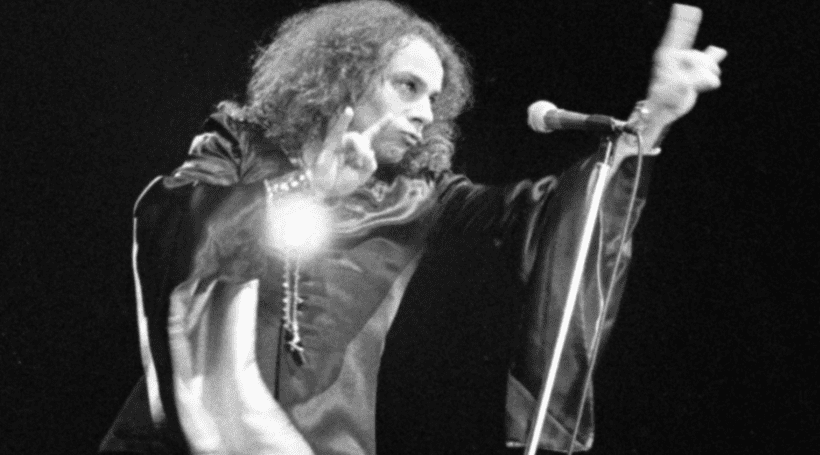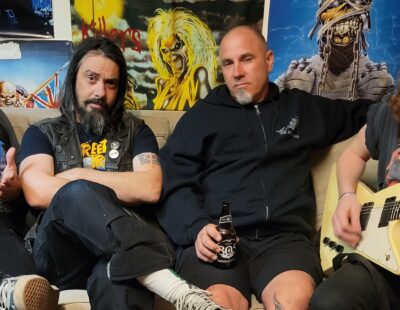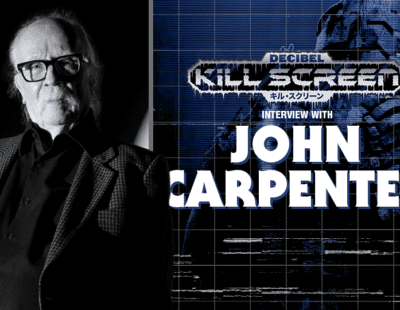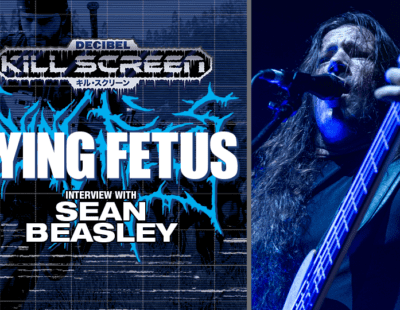
Perhaps no one is as universally beloved as Ronnie James Dio of all the figures in metal’s five-plus decade history. When Dio died more than a decade ago after years of touring with his Black Sabbath bandmates, it felt like a loss to our collective family. Needless to say, any film on his life will receive extra scrutiny because of that connection. Decibel is happy to report that Dio: Dreamers Never Die, by the same team that helmed the Bobby Liebling documentary Last Days Here, is wonderful, a labor of love that tells Ronnie’s story through the prism of chasing your dreams and fighting the odds. It’s a story about an everyman from New York who ended up playing in arenas and earning universal recognition as one of if not the defining voice of heavy metal.
Dio: Dreamers Never Die debuts at SXSW today. The filmmakers talked about how the movie came together and the lessons we can all take from Ronnie’s heroic journey.
How did this film come together?
DON ARGOTT: We met with [executive producer] Kathy Daum. We made a film called Believer that she really liked. She had some projects in development, and she pitched a few that weren’t for us. We kept the dialogue going. One night at about 10, there was an email from Kathy that said “Dio” in the subject line and then the text “any interest.” I forwarded it to Demian with a lot of exclamation points. Wendy [Dio] wanted to make a film for some time and talked to many filmmakers and didn’t get the right people. Kathy came along, and so the stars aligned. This is something we really wanted to do justice.
DEMIAN FENTON: We’re lifelong fans, so it was hard to get the responsibility of doing this film. You can tell in this film that we are Dio fans and that heavy metal is our faith. Dio was heavy metal incarnate. But Dio’s story wasn’t the Sunset Strip crash and burn story.
It’s interesting you bring that up. Ronnie’s life was devoid of the things that make up the bulk of most rock documentaries. Most of these films are cliche: rise to fame, get addicted, go broke, start the comeback. That isn’t Ronnie’s story. What is the arc when you have to do a story that’s nothing like that?
ARGOTT: That’s a great question. We chart out the first, second, and third acts whenever we start laying out a film. Ronnie had almost four full careers that span decades. You don’t want the film to feel like a historical narrative. Every career shift had to push the narrative forward, especially because he never fucked his whole life up or hit rock bottom. His career is a straight line. There are some pitfalls or lows, but it doesn’t follow the archetypal Behind The Music format.
FENTON: We tried to look at the footage as storytellers and take a step back. We tried not to be the people who listened to Dio. We thought: how does someone go from a crooner in the ’50s to battling an animatronic dragon on stage in the ’80s? That became a part of the arc. The interesting part of Ronnie’s story isn’t an OD or ending up in the hospital. It’s almost more heartbreaking when his career takes a hit with the hair metal crash and burn because he did everything right.
So what is Ronnie’s story about?
FENTON: Dreams. Perseverance. Taking challenges head-on. Believing in yourself and holding your ground. Never let anyone steer you down a path you don’t want to go on. When you get to the top, empower others. Ronnie’s story is not an easy three-act structure, so we embraced positivity. This is a story about righteousness.
What surprising things did you learn about Ronnie making this film?
ARGOTT: We heard that Ronnie was the sweetest guy and so sincere. We thought we’d find some proof of Ronnie being an awful person. And he wasn’t. Every one of our interviews ended in tears. People look for juicy, scandalous moments. Ronnie’s story was a life of righteousness. But that doesn’t mean chasing your dreams and being a perfectionist doesn’t cause some problems.
FENTON: We’ve been doing documentaries for a long time, and you do get close to the people you profile. Wendy had a lot of trust in us and gave us material, and stayed out of the way. It was nerve-wracking to screen it for her the first time because it was about someone she cared deeply about. Our biggest regret was that we never got to know Ronnie or spend time with him. To know that Wendy thought we did Ronnie justice was a big deal.
What was Wendy Dio’s reaction?
FENTON: We rented a little theater in L.A. to screen it for Wendy. We knew the film was emotional because we screened it for a few people. We bought a big box of tissues. I started to joke before the screening and said all we could get was this big box. She jumped back and said she wasn’t going to need tissues. Ten minutes after (the film), she sobbed. We had to leave the room. But the feedback was all super positive. I think the most rewarding experience was that she said Ronnie would love it and that there were so many memories there.
What are the plans for theater release or streaming?
ARGOTT: BMG funded it, but they won’t distribute it. The first public screening is at SXSW. We’ll use it as a launching pad for distributors. We hope someone picks up the right to release it. So this is the first step.
What would you want someone to carry away from this film as the documentarian?
FENTON: It should be the same thing whether you’re a Dio fan or never heard of him. Whatever you do, believe in yourself and do it full throttle to the best of your ability. This will lead you to a fulfilled life, whether you achieve it or not. There is something really nice about the film — this sincerity is packaged in heavy metal. I know the Mr. Rogers documentary inspired many people, and this has a similar pull.







